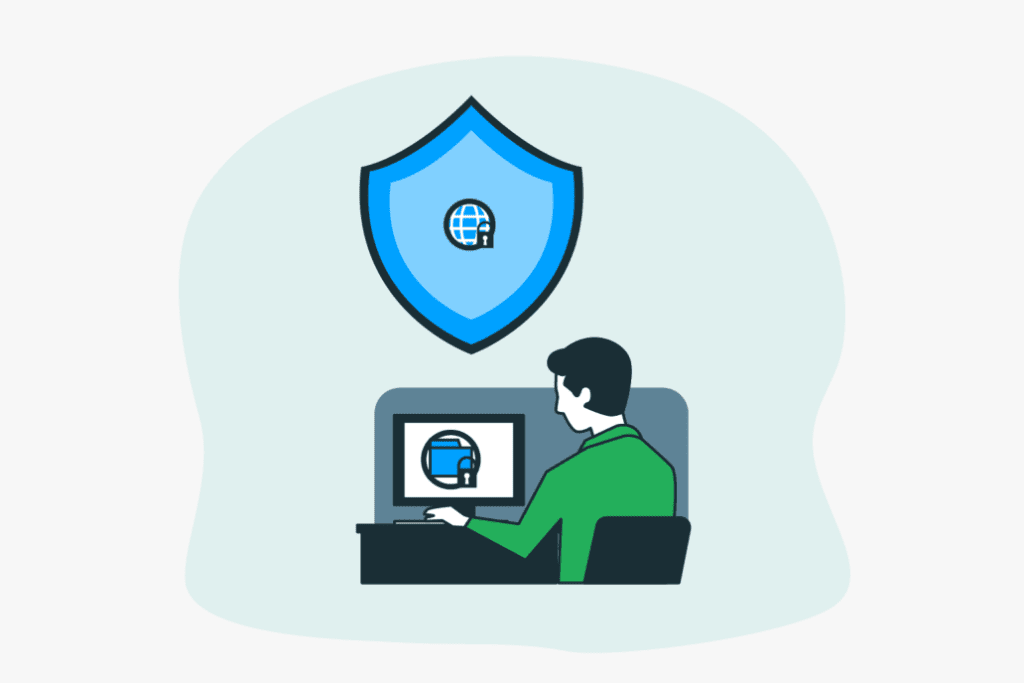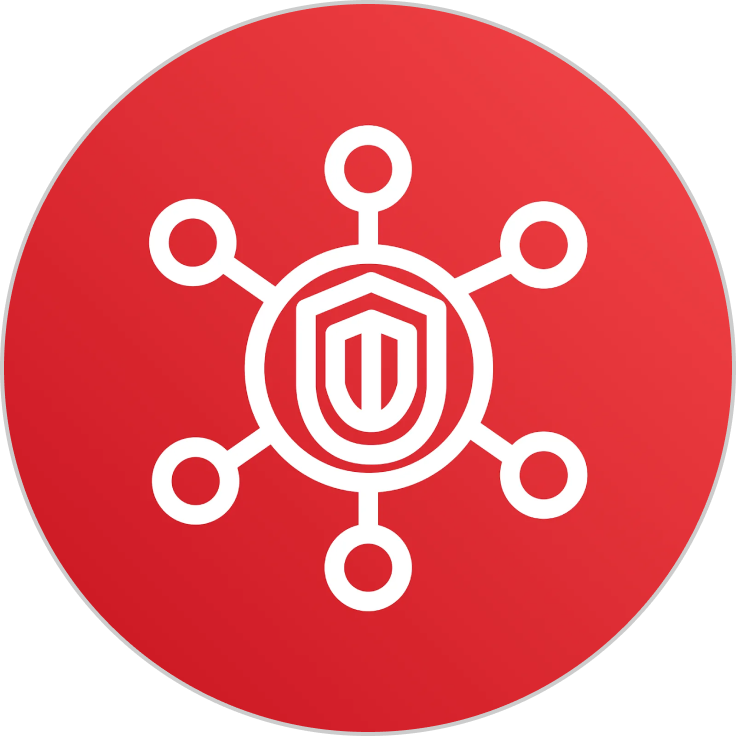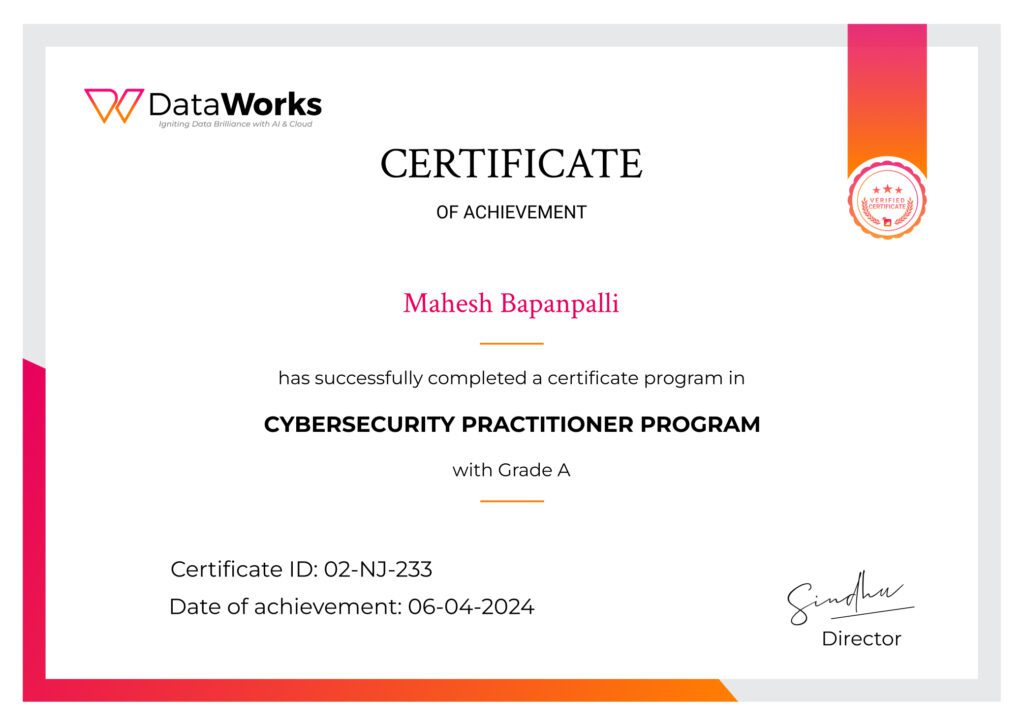Cyber security Practitioner Program
The Cybersecurity Practitioner Program by DataWorks is an intensive training course designed for individuals aiming to excel in the field of cybersecurity. This comprehensive program covers a wide array of topics, from foundational principles of information security to advanced techniques in penetration testing, digital forensics, and incident response. Participants will gain hands-on experience with real-world security tools and technologies, learning how to protect systems, networks, and data from cyber threats and vulnerabilities. The curriculum emphasizes practical skills and knowledge applicable to securing modern digital environments, preparing students for a career as proficient cybersecurity professionals.
5.0 (130 Ratings)
Course Info
Fundamental concepts of cybersecurity, including risk management and the cybersecurity framework.
Techniques for securing networks, systems, and applications from cyber threats.
Hands-on experience with tools for penetration testing, vulnerability assessment, and ethical hacking.
Strategies for detecting, responding to, and recovering from security incidents.
Principles of digital forensics for investigating and analyzing cyber attacks.
Understanding of compliance and governance in cybersecurity, including laws and standards.
Preparation for globally recognized cybersecurity certifications.
Course Content
Basic Principles of Cyber Security: Understanding the core concepts of cyber security.
Cyber Threats: Identifying various types of cyber threats.
Security Technologies: Overview of technologies used in cyber security.
Network Protection Strategies: Techniques for protecting networks.
Firewalls: Implementing and managing firewall systems.
Intrusion Detection Systems: Setting up and configuring intrusion detection systems.
Secure Coding Practices: Best practices for developing secure applications.
Web Application Vulnerabilities: Identifying and mitigating common vulnerabilities in web applications.
Penetration Testing: Techniques and tools for testing the security of applications.
Incident Handling: Techniques for managing security incidents.
Threat Analysis: Methods for analyzing and understanding cyber threats.
Response Planning: Developing plans for responding to security incidents.
Authentication and Authorization: Methods for verifying user identities and granting access.
Identity Management: Managing user identities within an organization.
Access Control Mechanisms: Implementing access control strategies.
Cryptographic Principles: Fundamental concepts of cryptography.
Encryption Techniques: Techniques for encrypting data.
Key Management: Managing cryptographic keys.
Regulatory Compliance: Understanding compliance standards in cybersecurity.
Security Auditing: Techniques for conducting security audits.
Risk Assessment: Assessing risks in cybersecurity.
Latest Trends in Cyber Security: Exploring current trends such as AI in security and blockchain technology.
Innovations in Cyber Security: Identifying and understanding innovative technologies in cybersecurity.
Comprehensive Cyber Security Project: Application of all learned concepts in a significant cybersecurity project.
Real-World Scenario: Addressing a realistic cybersecurity challenge or scenario.

-
LevelIntermediate
-
Total Enrolled1
-
Last UpdatedAugust 21, 2024
Upskill for your Dream Job

Hiring Partners





A basic understanding of IT and networking concepts.
Familiarity with operating systems, particularly Windows and Linux.
Eagerness to learn about cybersecurity practices and technologies.
Access to a computer with internet connectivity for practical exercises.
FAQ's
The program is structured to be completed in 12 weeks, with a mix of online lectures, lab exercises, and project work.
Participants will need a computer with internet access. All required software, including virtual machines for labs, will be provided or available for free.
Yes, the course is designed to lay a strong foundation for several cybersecurity certifications, including CompTIA Security+, CEH (Certified Ethical Hacker), and CISSP (Certified Information Systems Security Professional).
Graduates can pursue various roles in the cybersecurity field, such as security analyst, penetration tester, security engineer, cybersecurity consultant, and more.
Yes, DataWorks awards a certificate upon successful completion of the Cybersecurity Practitioner Program, signifying your preparedness to enter the cybersecurity workforce.
Earning Potential
5 LPA
min
10 LPA
avg
18 LPA
max
Cyber security Practitioner Program Tools Covered

Metasploit

Symantec

Google Cloud Security Command Center

McAfee

AWS Security Hub

Azure Security
Cente
Let’s explore further the implications of transitioning to online training
Course Certificate
The Cyber Security Practitioner Programming Course Certificate focuses on enhancing coding skills for securing applications and systems. The curriculum covers topics like secure coding practices, ethical hacking, and defensive programming. It’s ideal for developers and security professionals aiming to bolster their cybersecurity expertise.

Course Reviews

Lucas.A

Kunal.K

Omkar.J

